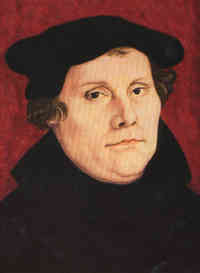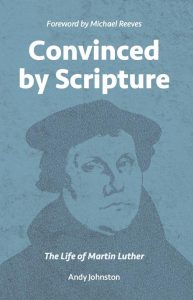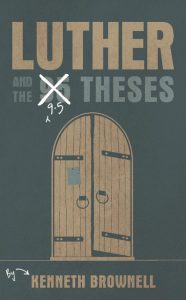Proclaimer Blog
Convinced by ‘Convinced by Scripture’ – Andy Johnston
For a small (almost pocket size) biography, Andy Johnston has done a remarkable job of packing in a wealth of historical nuggets and theological reflections on the life of Martin Luther. The prospect of reading a book on church history can seem both exciting and daunting (for some it is exclusively the latter). But, do not fear, as Johnston has produced a personal, compelling and easy read, that will likely stir an interest to find more by and about Luther.
Each chapter is neatly organised by a portrait of Luther, for example, as “the heretic”, “the reformer”, “the family man” and “the flawed character”. I managed to read the book in one sitting, which was credit to Johnston’s clear and succinct presentation and style as much as it was to the book being short.
A notable strength of the book is that it is far from an emotionally detached historical survey of Luther’s life and his ideas. What this means for the reader is that it feels very much like going on a personal journey with Luther, with Johnston capturing in vivid detail Luther’s moments of existential crisis and his ruminations on God and biblical theology.
In his foreword to the book, Professor Michael Reeves describes finding Luther as his “soul-mate” and someone to be cherished and enjoyed by Christians today. A deeply personal narrative continues throughout the book, for example, in a compelling account of Luther’s early life as a monk, Johnston brings to life Luther’s mental torture, his “hell on earth” experience of living on a daily basis “with the reality that God was angry with his sin” (p.16). Later in Luther’s life, Johnston continues to bring Luther to life on the page in describing the progression of Luther’s ruminations on the mercy of God. This reaches a “climax” for Luther as he mulled over Romans and let it captivate his mind and heart to understand the gospel in a new light and so enable “millions of people to come into a living encounter with the grace of God” (p.23).

Again, considering the length of the book, Johnston does well to include a number of original quotations to ensure the reader gets a good feel of Luther in his own words. One of the quotes is worth including here:
“Unless I am convinced by the testimony of Holy Scriptures or by reason – for I can believe neither popes nor councils alone, as it is clear that they have erred repeatedly and contradicted themselves- I consider myself convicted by the testimony of the Holy Scripture, which is my basis; my conscience is captive by the Word of God. Thus I cannot and will not recant, because acting against one’s conscience is neither safe nor sound. God help me. Amen” (p.53)
Captivating indeed! As well as helpful quotes such as the one above which shed light on Luther’s inner turmoil and theological reflections, Johnston also details Luther’s political battles and provides a good flavour of the Ninety-Five Theses, with various extracts in his chapter entitled “the Reformer”.
Johnston is also adept at offering a balanced view of Luther and adds touches of wit and humour at various points throughout the book. He is careful to note the critics of Luther, and does not refrain from highlighting (and condemning) the repugnant elements in Luther, including his anti-Semitism. Johnston does not paint Luther as a flawless figure and tackles the controversial issues head on.
There are humorous historical anecdotes along the way, with Duke Frederick’s quirky collection of relics, including the thumb of St Anne, and Luther’s devotion to an accurate OT translation taking him to the local butcher to see a sheep getting the chop!
Those looking for a more nuanced and scholarly theological treatment of Luther will be disappointed. The absence of references and pointers to further reading may feel like a glaring omission for some, and coverage of aspects of Luther’s theology is simplified. For example, Johnston states that Luther “completely separated the process of sanctification from the act of justification” (p.21). But further study reveals Luther did not in fact make the distinction between justification and sanctification associated with later Protestantism, and his position on justification was much closer to Augustine than is generally realised (see A. McGrath’s Iustitia Dei for a thorough treatment of Luther’s theology of justification). The separation of justification and sanctification can be traced to Luther’s colleague, Philip Melanchton, and then more fully developed in John Calvin. But in Johnston’s defence, a scholarly treatment of Luther’s theology is beyond the scope of a book that will no doubt serve to enthuse readers to continue probing into Luther’s life and theology.
As well as bringing the Luther for “them/then” to life, Johnston also has much to say about the Luther for “us/now”. He is mindful of the present-day threats to Christianity that closely parallel those for Luther in the sixteenth century, including the threat to the authority of Scripture by liberal or “post-evangelical” thinking. Johnston finishes the book with a clarion call for Evangelicals today:
“In a sense very little has changed. Twenty-first century Europe is just as dark, just as ignorant and just as sinful. Consequently there is just as much a need today for the sort of fearless proclamation of the Gospel as Luther made five hundred years ago”. (p.103)
This is a great read and a really good book to use as a first step into reformation church history as the life of one of the most colourful reformers is painted on the pages of this accessible and intriguing volume.
- By Simon Jones
Proclaimer Blog
Born to Reproduce… Olden, Golden & Essential
This is a short, readable and insightful book about One to One evangelism and discipleship through the eyes of Dawson Trotman. Dawson Trotman founded and directed The Navigators from 1933-56 when he died rescuing another person from drowning.
Dawson’s goal was ‘to know Christ and make him known’.
Dawson’s twin passions were people and the Word. His method was first to win an individual, then teach them to win another individual and so multiply ministry. He argues that every Christian is born to reproduce or win souls for Christ – not ‘en masse’, but one at a time. He says: “ask God to give you one. You can’t have two until you have one”.

This is an inspiring and challenging book for every Christian. It is inspiring because Trotman provides solid biblical base alongside real-life examples of how multiplying ministry is not only possible for every Christian, but also visibly fruitful. It is challenging because Trotman is not shy to speak plainly about the obstacles of disunity, sin and immaturity which prevent many ‘busy Christians’ from undertaking this vital ministry.
As he says: “You can lead a soul to Christ in twenty minutes… but it takes… a couple of years to get him on the road to maturity”
Whilst Trotman places an unfashionable emphasis on memorising scripture; his love for people, the Word and genuine growth, makes this olden but golden booklet a timeless classic; a surprisingly relevant and worthwhile read.
by Rebekah Brown
Proclaimer Blog
10 out of 10 for Luther and the 9.5 Theses
Ken Brownell’s (East London Tabernacle) book, Luther and the 9.5 Theses is a little gem of a book. 100 small pages of church history coupled with compelling contemporary application and exhortation.
“In short, while our circumstances are very different from those of Luther in the late 16th century…, the need for the Christianity that emerged from the reformation is still as great if not greater.” (p.4)
It is very much a book of two halves. The first couple of chapters are the historical background to the posting of the 95 theses, the run up to 31st October 1517 and the ramifications afterwards. The second half is looking at the detail of the 95 theses and applying their significance for the church in the 21st century.
The analysis of the 95 theses and the context surrounding their posting is spot on, with pithy observation and enough detail to inform without swamping the reader. The following 10 short chapters are heart warming, zeal nurturing and challenge bringing.
“What needs to be recognised is not only we need academic training but also that such learning must fear God and be intellectually rigorous.” (p.44)
Ken has done a wonderful job in writing this book, the tone is just right, the content intriguing without being exhaustive and the message much needed in our churches.

This would be a great book to leave with someone after a pastoral visit. Something that is an easy and a worthwhile read that will hopefully resonate with a church member and join some of the dots in their understanding of the seismic events that happened during the reformation and the legacy of which they inhabit today.
“Reformational Christians and churches must commit themselves afresh to the gospel of God’s saving grace in Jesus Christ that Luther and other reformers rediscovered in the 16th century.” (p.97)
This book will also be our £1 exit book on Tuesday 27th at the Evangelical Ministry Assembly so be sure to have raided your piggy bank.
Proclaimer Blog
There is such a thing as a free lunch…
New for EMA 2017 – we are holding a Newcomers Reception at lunchtime on the first day of the EMA (Tues 27th June).
It can be unnerving turning up to a big conference not knowing many people. So, to help those attending for the first time to settle in quickly, we want to invite all first time delegates to join us for lunch at 1pm in the 1st floor Balcony Room.
We will be sending out invites and further details to all first time delegates in the coming days, so if you still haven’t booked, book now, we would love to welcome you.
Proclaimer Blog
5 Ministry Benefits from Spring Younger Ministers’ Conference 2017
Stick just under 100 ‘younger ministers’ in a conference centre for the best part of a week and what do you get? Strutting stallions? Ministry-jostling? Thankfully not. Here are 5 blessings I’m thankful for as I look back at the recent Spring Younger Ministers’ Conference 2017:

1. Being inspired to stick at a ministry of the word and prayer. It’s hard, isn’t it, this pastor-teacher thing. But I came away renewed to give myself to it. In particular, the time we spent in our preaching workshop groups, with eight or so other delegates and one senior minister, was just what I needed. Digging into Song of Songs with Vaughan Roberts and a bunch of peers was a fresh reminder of the richness of God’s word, both feeding my own heart and demonstrating its irreplaceability in ministry. Having renowned NT professor Doug Moo take us on a ‘mini-break’ jaunt through Hebrews in the main conference sessions was a bonus.
You can listen to the talks from the conference here.
2. Quality time with your mates. Definitely not to be under-estimated. Five of us from the same year-group at college had all committed to booking onto the conference together, and it was such a gift to have that extended time to informally hang out and talk life, the universe and everything. Friendships with ministry peers are hard enough to maintain, so for me, a conference where you’re all staying in the same place – with the even braver option of staying in the same room – is always going to beat day-only events.
3. Being exposed to others’ creativity and ministry ideas. As well as seeing old friends, there were a handful of stand-alone conversations with people I’d either never spoken to before, or didn’t really know personally, and yet they were chats that really set me thinking. For example, I had some creative conversations about church-planting and keeping going.
By the way, I happened to ask a mate beforehand if they were going on the conference and they said they weren’t really the ‘Proc Trust’ type. Hmm! Looking around the centre, ok, yup, most of us were probably early-to-mid-30’s and working as assistant pastors/curates (although even that certainly wasn’t everyone) – but amongst those of us fitting that ‘mould’, I reckon there was still a decent ‘spectrum’. So, wherever you’re coming from culturally, and whatever your church is like, if you’re convinced about prioritising the ministry of the word, then I’d hope you’d find the conference a blessing.
4. Getting tooled up by the ‘experts’.
Here I’m thinking particularly of Rico Tice’s double-session on ‘The Pastor & Personal Evangelism’ and ‘The Pastor & Church Evangelism’. Just brilliant. I haven’t taken notes so furiously since that Christian dating seminar I went to at uni. Of course, I’m sure Rico would object to the notion of ‘expert’, but his trademark honesty, unashamed conviction, and well-trodden practice make for a killer combo.
5. Ahh, rest.
Ok, it’s not a holiday – but I got a whole load more sleep than usual, and I didn’t have to do any washing-up. Hothorpe Hall is a top-notch venue for the week: excellent food, glorious surroundings (I even went for a run. I never run!), as well as a fantastic bar & lounge area for downing endless macchiatos or catching up over an evening beer.
See you next year….?
The next Spring Younger Ministers Conference is 30th April – 3rd May 2018 at Hothorpe Hall where we will be joined by Gary Millar who will be helping us think through preaching Deuteronomy. Bookings will be open soon.
Robin Ham is involved in church-planting in Barrow-in-Furness, Cumbria. He blogs here. Twitter: @rhamage
Proclaimer Blog
We’re looking for an events manager (maternity cover)

We are looking for a full-time person as maternity cover for our
Events Manager
The post is a maternity cover contract. It is a genuine occupational requirement that the office holder be in sympathy with the aims and beliefs of The Proclamation Trust.
Suitable candidates will be highly efficient and organised administrators, able to manage multiple projects simultaneously and have excellent communication skills. Our office is located close to London Bridge station. The salary is £28,500pa.
Further details and a job desription are available here
Please send a CV and covering letter to pt@proctrust.org.uk by 31st May 2017.
Proclaimer Blog
Welcome to Jon Gemmell
We’re delighted that Jon Gemmell has joined us as Associate Director for Conferences and Resources. Jon was at the younger ministers’ conference last week and is in the office from this week. Jon joins us to work three days a week primarily on our conference programme. He comes to us from Scotland where he was senior pastor of Bruntsfield Evangelical Church in Edinburgh for 7 years, during which time he was also Director of Edinburgh City Mission and chairman of the East of Scotland Gospel Partnership. We’re looking forward to Jon being on the team!
Proclaimer Blog
Cornhill next year
Details of our plans for the future of Cornhill are now online.
At the thanksgiving service for 25 years of Cornhill I outlined the plans and the thinking behind them – you can watch the video below.
The Cornhill pages of our website have now also been updated to reflect the new structure of the course (details particularly in the Content section). And applications for next year are also now open.



